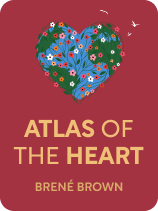

This article is an excerpt from the Shortform book guide to "Atlas of the Heart" by Brené Brown. Shortform has the world's best summaries and analyses of books you should be reading.
Like this article? Sign up for a free trial here .
How important is it for humans to feel love and belonging? What exactly is love?
According to Brené Brown, love and belonging are essential to human well-being. Belonging is when you can truly be yourself, and the people around you love you for it. Love is a deep form of shared belonging.
Keep reading to learn about the human need for love and belonging, according to Brené Brown.
Love, Trust, and Vulnerability
According to Brené Brown, love and belonging are basic human needs. Brown defines love as a deep and fulfilling connection between people. Brown says that love begins with deep trust and the freedom to be yourself: You open yourself up to another person, and that other person opens up to you. You leave yourselves vulnerable to each other and honor that shared vulnerability with kindness, respect, and warmth.
Trust is the choice to take something that’s important to you and make it vulnerable to another person—it’s the belief that something you value deeply will be safe with another person. For example, when you hire a babysitter, you’re trusting that person with your child; when you confess your feelings for someone, you’re trusting that person with your emotional well-being.
Vulnerability is what you experience when you take a risk, or leave yourself open to emotional harm. Even Brown has a hard time explaining exactly what vulnerability is, but it’s what you might feel when you confess your feelings for someone or ask for feedback on a deeply personal issue—it’s the knowledge that you’ve exposed an emotional weak spot and that someone could use it to hurt you.
However, Brown says that vulnerability is a prerequisite for courage: You have to make yourself vulnerable in order to take big chances like starting a new career, entering a new relationship, or taking on a leadership role.
| You Cannot Be Harmed Marcus Aurelius’s Meditations—one of the definitive books on Stoicism—argues that we shouldn’t fear opening up to others simply because there’s nothing to be afraid of. According to Stoicism, a philosophy based on logic and duty, the only thing that can truly hurt us is something that hurts our character; which, to a Stoic, means something that affects our ability to be rational or our willingness to carry out our duties. Because of that belief, a Stoic like Aurelius would embrace love and trust freely, and he wouldn’t be afraid to leave himself emotionally vulnerable by doing so. Aurelius would argue that emotional pain doesn’t matter because it isn’t truly harming him. Furthermore, he’d say that taking advantage of his vulnerability is a failing on the part of the other person, not himself. |
Belonging Versus Fitting In
According to Brown, belonging means being someplace where you want to be, and others want you there; it’s a true connection with a group of people.
Conversely, “fitting in” is the near enemy of belonging: It resembles true belonging, but lacks the connection and love. It’s being somewhere you don’t necessarily want to be, and where you have to adjust your behavior to match the others. Far from trying to forge genuine connections, you’re putting up a false front just to avoid negative attention.(Shortform note: Another way to look at the difference between belonging and fitting in is: Fitting in means changing yourself to match your environment, while belonging means finding or creating an environment that matches you. In other words, fitting in means focusing outward, while belonging means focusing inward. Therefore, it’s natural that true belonging is more personally fulfilling than simply fitting in.)

———End of Preview———
Like what you just read? Read the rest of the world's best book summary and analysis of Brené Brown's "Atlas of the Heart" at Shortform .
Here's what you'll find in our full Atlas of the Heart summary :
- Brené Brown's guide to the many emotions and mental states that people feel
- Explanations of 87 emotions, along with the situations where you’re likely to encounter them
- How to form deeper connections with the people around you






